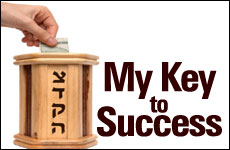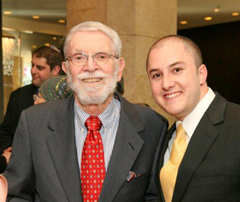 Iran’s Attack on Israel
Iran’s Attack on Israel


3 min read
4 min read
4 min read
7 min read
A profile of philanthropist Chuck Boxenbaum.
Born and raised in Rockaway, New York in the 1930s and ‘40s, Chuck Boxenbaum grew up firmly steeped in Jewish values during his formative years. His father emigrated from Poland at age 13 and built up a company manufacturing bedspreads and draperies.
Although Chuck never lacked anything growing up, the family was not wealthy by any means. Nevertheless, his father pledged $5,000 to raise money to buy ammunition and supplies for the Jews of Palestine – an exorbitant sum at that time. Chuck asked his father where they would get that kind of money. His father replied that he was going to take a bank loan in order to give charity.
From this incident, Chuck began to see the great value of giving tzedakah to Jewish causes – a value that would stay with him throughout his life.
Falling In Love with Israel
After finishing his degree at the University of Chicago in 1949, Chuck decided to visit the fledgling Jewish State. “I was inspired by all the excitement of the War of Independence a year earlier and wanted to give it a try,” he recalls. “I didn’t even wait for the graduation ceremony. I just jumped on a Turkish Tramp Steamer bound for the Land of Israel.”
Chuck never dreamed he would fall in love with Israel and end up staying for two years, living on a kibbutz on the northwest coast, just outside of Nahariya. He worked in the carpentry shop making wooden window shades for absorption centers for new immigrants.
If not for the Korean War he may have stayed forever, but in 1951 Chuck received a draft notice to join the United States Army. When his father called to tell him the news, Chuck adamantly refused to leave Israel. “I’m not going back to fight in Korea,” he told his father, and wondered aloud, “What will happen to me if I don’t go back?”
His father had already asked this question to the draft board; the response was that if Chuck doesn’t return to the U.S. to report for duty, he should never come back! Although Chuck loved Israel, he wasn’t prepared to burn bridges with his motherland, so he returned to America.
The army was Chuck’s first real contact with non-Jews.
It turns out the army was a positive experience. Chuck was drafted into the 8th U.S. Army Korea G2–Intelligence unit and spent the next 18 months in Korea. “We got a tremendous amount of information and had to make sense of it,” he said. “It was essentially an office job, which was wonderful since I came back with two arms and two legs!”
 Chuck Boxenbaum at the Aish LA dinner
Chuck Boxenbaum at the Aish LA dinnerThe army was Chuck’s first real contact with non-Jews. “All my friends growing up throughout high school and college were Jews,” he explains. “My first broader experience was in the army and most of the folks were terrific. This opened up a completely different world for me.”
One of his close friends in the army was a cowboy from Iowa. When someone once directed toward Chuck an off-color remark with anti-Semitic undertones, the cowboy knocked the guy out cold. Another Jew in his unit kept kosher; the Mess Sergeant was from Mississippi and even though he never met a Jew before, he always made sure to point out the foods that were made with kosher ingredients.
California Dreaming
After being discharged from the army at the conclusion of the Korean War in 1953, Chuck decided to move to California for a change of scenery. “California is full of escapists,” he says, “and I was escaping my father’s business. Bedspreads and drapery weren’t for me.”
In Los Angeles, Chuck got a job as a real estate agent. “It was easy to get a job in real estate,” he recalls. “You only got paid on commission.” He soon got into commercial real estate and finally moved onto syndication. He eventually became CEO of a company that was managing some 70,000 apartments.
The secret to my successful marriage is that I keep my mouth shut.
Chuck began dating his wife, Kharlene, whom he’d met earlier on the East Coast through the Jewish Federation of New York, and they were married in 1962. They’ve enjoyed a happy marriage ever since. What’s their secret to a successful marriage? “I kept my mouth shut,” he says. “My wife is terrific for putting up with me all these years.”
Today, Chuck is 82 years old and in the prime of life. He sold his business six years ago. “It was the greatest day of my life,” he said. “I had begun to hate my job. We had real estate in 40 states. You can’t do real estate by remote control and traveling was hard work.” Even at his age, he enjoys skiing in the Sierra Mountains. “In my youth I would ski all day. Now I quit at noon. The resort gives skiers over age 80 a free season pass. That tells you there aren’t too many of us.”
Chuck is strongly committed to Jewish education and values. For years he’s been attending Torah study classes with Aish LA. “It’s good to think about something else besides trying to make money every once in a while,” he says. “Jewish education is critically important if we’re going to have a steady supply of future Jewish leaders who are instilled with Jewish values like Israel, education, kindness, and tzedakah. If everyone had Jewish values, the world would be a better place.”
The Greatest Pleasure
Chuck’s greatest pleasure in life may not be what he does, but rather what he gives. He is a leading supporter of several Jewish organizations including the Los Angeles Jewish Federation and the Jewish Community Foundation. In 1999, Chuck and Kharlene became the magnanimous benefactors of the Boxenbaum Aish Center in Los Angeles.
“It feels good to give,” Chuck says. “Giving charity is one of the greatest pleasures in life, but it’s also a powerful obligation. If there’s a community, you have to support it. There are no free rides. It doesn’t matter how much you give, but give whatever you can.”
The more you give, the more you get.
From his years of experience, Chuck has detected a pattern between giving charity and becoming financially successful. “Nobody ever went broke from tzedakah,” he said. “Somehow all my life, whatever I gave away seemed to come back faster than I gave it. The more you give, the more you get. It’s magnetic. That state of mind helps you succeed. If you’re small and tight, you think small and tight. If you act and think big, you do big. People who don’t give are all shriveled up. Giving is wholesome. Most of the active givers and fundraisers are successful financially. It’s not a coincidence.”
Chuck offers advice for those starting out in business: “Find yourself a good mentor. A lot of successful people would love the role of helping a younger person. Most of the mentoring I do is teaching people to fundraise. Most people are shy. The key is eyeball-to-eyeball selling. Don’t call the guy up – that’s third rate. Point out the needs, which are gigantic, and explain how others are helping.
“The best thing you can do, however, is to set an example. You can’t ask people for a donation unless you’re giving yourself. Being a giver is the key to success!”
